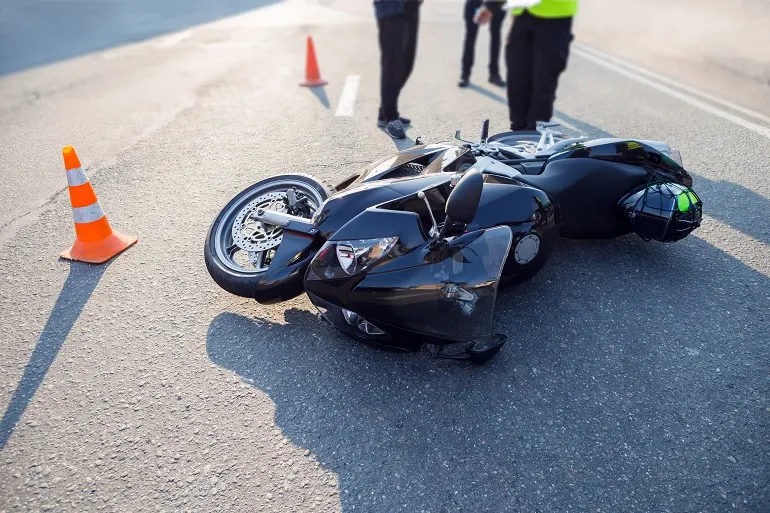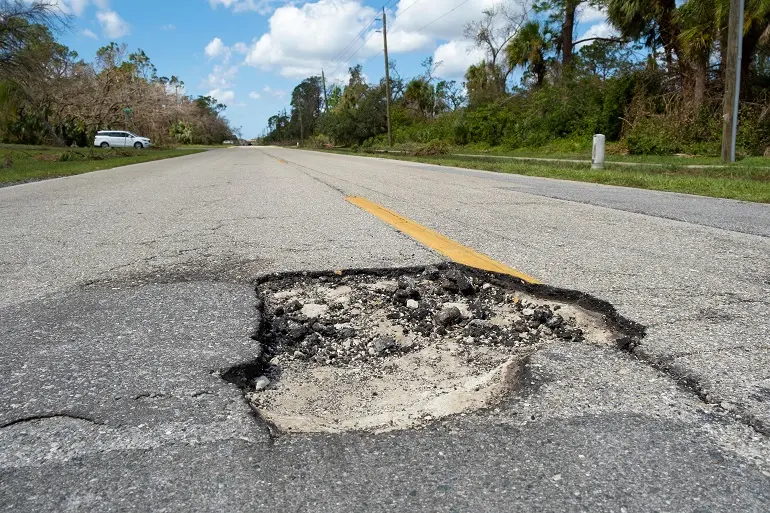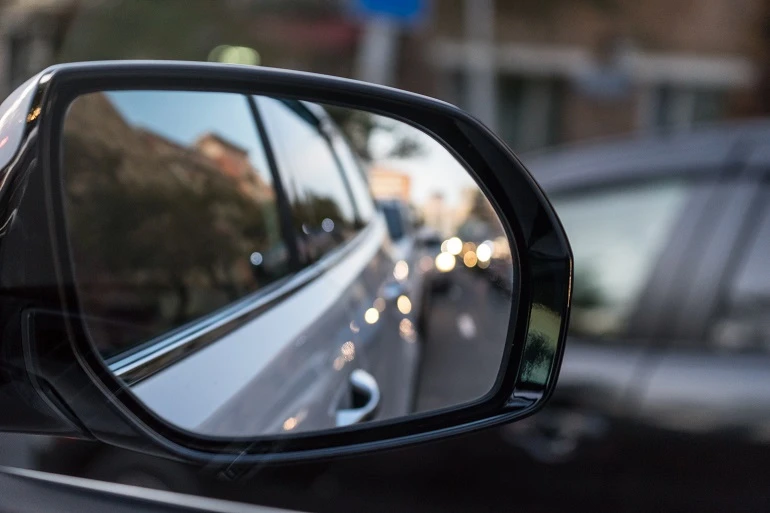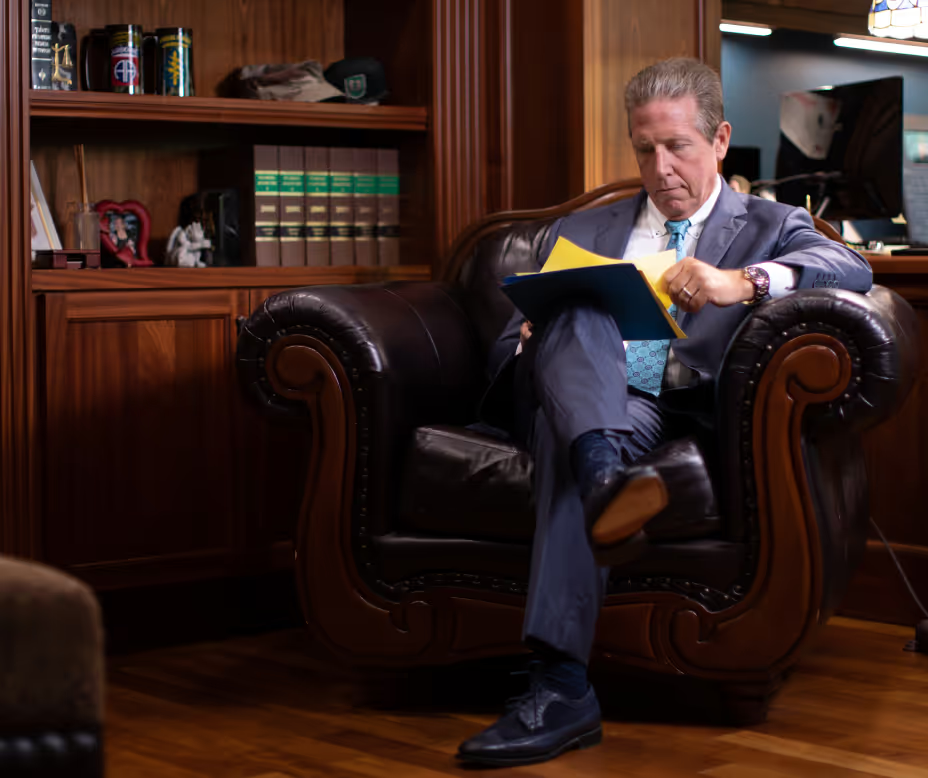Florida's warm climate and scenic roads make it a motorcyclist's paradise, attracting both residents and tourists to explore the Sunshine State on two wheels. However, this popularity comes with a significant downside: Florida consistently ranks among the states with the highest rates of motorcycle accidents and fatalities in the country.
2021 NHTSA data paints a grim picture of motorcycle safety. A staggering 635 motorcyclists were killed in fatal accidents in Florida that year, the highest number since 1975, and 17% of Florida traffic fatalities.
Helmet use, while at 64.9% overall in the country, remains a critical issue; 55% of motorcyclists killed in states without universal helmet laws were unhelmeted. These statistics highlight the urgent need for improved safety measures and rider responsibility.
Injured in a Florida motorcycle accident? Discuss your case with our experienced motorcycle accident attorneys. No obligation, just answers and guidance.

Top 10 Causes of Motorcycle Crashes in Florida
Florida's beautiful roads attract many motorcyclists, but they also present dangers. Understanding the top 10 causes of motorcycle crashes is crucial for rider safety.
Left-Hand Turns: A Persistent Danger
Left-hand turn accidents are among the most common and dangerous types of motorcycle crashes in Florida. According to NHTSA data, in roughly 10% of fatal motorcycle crashes between 2011 and 2019, a vehicle was turning left across the path of the motorcycle.
These accidents typically occur when:
- A car driver fails to see an oncoming motorcycle and turns left in front of it
- The driver misjudges the motorcycle's speed or distance
- The driver is distracted or not fully attentive to the road
For motorcyclists, these scenarios often leave little time to react, especially when traveling at higher speeds. The resulting collision frequently involves the front of the motorcycle striking the side of the turning vehicle, which can eject the rider and cause severe injuries.
To reduce the risk of left-turn accidents, riders should:
- Always assume they are invisible to drivers making left turns
- Watch for telltale signs of a vehicle preparing to turn, such as wheels beginning to turn or the vehicle edging forward
- Reduce speed when approaching intersections
- Position themselves for maximum visibility
Lane Splitting: Legal in Other States, Risky in Florida

Lane splitting — riding between lanes of slow-moving or stopped traffic — is a practice that divides opinion in the motorcycle community. In Florida, lane splitting is prohibited, making it illegal for motorcyclists to ride between lanes. Despite this prohibition, some riders still engage in the practice, often leading to accidents.
The dangers of lane splitting in Florida include:
- Drivers are not expecting motorcycles to pass between lanes
- There is limited space to maneuver if a car changes lanes suddenly
- Riders have reduced reaction times due to their proximity to other vehicles
- There is potential for doors opening or drivers extending their arms out of the windows
Even in states where lane splitting is legal, it requires skill and caution. In Florida, where drivers are not accustomed to watching for lane-splitting motorcycles, the practice is particularly dangerous and can result in legal consequences as well as crashes.
Speeding and Impaired Driving
Speed and impairment remain major factors in motorcycle accidents in the U.S. According to data reported by NHTSA's National Center for Statistics and Analysis, 33% of motorcycle riders killed in crashes in 2021 were speeding, compared to just 22% of motorists in passenger cars.
The risks associated with speeding on a motorcycle include:
- Reduced reaction time to avoid hazards
- Increased stopping distance
- Less stability during emergency maneuvers
- More severe injuries due to greater impact forces
Alcohol impairment compounds these risks significantly. According to current numbers, alcohol use was a factor in 42% of single-vehicle fatal motorcycle accidents in 2022. Motorcycle riders who died in nighttime traffic crashes were 3 times more likely to be alcohol-impaired than drivers killed in daytime crashes.
The combination of motorcycles' inherent instability and the coordination impairment caused by alcohol makes riding under the influence particularly dangerous. Florida's warm climate and vibrant nightlife can create situations where impaired riding becomes tempting, but the statistics clearly show the deadly consequences of this decision.
Hazardous Road Conditions
Road hazards that might be minor inconveniences for cars can be life-threatening for motorcyclists. Road construction, obstacles, and roads in disrepair can lead to motorcycle accidents. These adverse road conditions can cause a rider to run over an object such as a rock or gravel, slide or skid, or even be thrown, depending on the situation.

Common road hazards for motorcyclists in Florida include:
- Potholes and uneven pavement
- Sand, gravel, or debris on roadways, particularly common near beaches and construction sites
- Oil spills and fluid leaks from other vehicles
- Poorly marked construction zones
- Standing water after Florida's frequent rain showers
Motorcyclists need to scan the road surface constantly, looking far ahead to spot potential hazards. Maintaining a safe following distance gives riders more time to identify and safely navigate around road hazards.
The Risks of High-Performance Motorcycles
High-performance motorcycles, while exciting to ride, come with additional risks that contribute to Florida's high accident rates. These powerful machines can accelerate from 0 to 60 mph in under three seconds, offering thrills but also tempting riders to exceed their skill levels.
Nearly half of all motorcycle drivers killed in 2022 had engine sizes of 1,000 cc or smaller; of those, about half had supersport motorcycles. Thirty-four percent of motorcyclists killed in 2022 had engine sizes of 1,401 cc or higher. These statistics highlight the dangers associated with both smaller, high-revving sport bikes and larger, powerful cruisers and touring motorcycles.
The risks associated with high-performance motorcycles include:
- Greater potential for speed-related accidents
- More challenging handling characteristics that require advanced skills
- Powerful acceleration that can surprise inexperienced riders
- Higher likelihood of risk-taking behavior
New riders in particular should consider starting with smaller, more manageable motorcycles until they develop the skills and judgment necessary to safely operate high-performance machines.
Riding in Inclement Weather

Florida's reputation for sunshine can be deceptive — the state also experiences frequent and sometimes sudden rain showers, thunderstorms, and occasionally even tropical storms or hurricanes. Motorcycle riders must take extra precautions when riding in certain weather conditions.
When it rains, the ground becomes slick and slippery, which can make it more difficult to slow down and brake when necessary. Fog makes it more difficult to see, increasing the risk of a motorcycle accident.
Weather-related challenges for Florida motorcyclists include:
- Reduced visibility during heavy rain or fog
- Decreased traction on wet roads, especially during the first rain after a dry period, when oil residue makes surfaces particularly slippery
- Strong crosswinds
- Standing water causing hydroplaning
- Lightning risks during thunderstorms
Proper gear for varying weather conditions is essential, as is knowing when to delay a ride or seek shelter when conditions deteriorate. Modern weather apps make it easier than ever to plan rides around weather events, which is a prudent practice for Florida motorcyclists.
Blind Spot Accidents: Drivers Failing to See Motorcycles
One of the most common phrases uttered after a car-motorcycle collision is, "I did not see the motorcycle." The small profile of motorcycles makes them easier to miss in traffic, particularly in drivers' blind spots. Motorists who fail to see motorcycles are likely to merge into motorcyclists or cause other accidents.
Blind spot accidents typically occur when:
- A driver changes lanes without thoroughly checking blind spots
- A motorcyclist rides in a driver's blind spot for an extended period
- Poor visibility conditions (rain, dusk, dawn) make motorcycles even harder to see
- A driver is distracted and not fully engaged in the task of driving
Motorcyclists can reduce their risk by following these tips:
- Avoid riding in other vehicles' blind spots
- Use headlights at all times
- Wearing high-visibility clothing and using reflective materials
- Assuming they are invisible and riding defensively

Distracted Driving: A Growing Threat
Distracted driving has become an epidemic on American roads, and Florida is no exception. Motorcycle riders who text, eat, or use handheld mobile devices while driving are more likely to be involved in crashes. Both distracted car drivers and distracted motorcyclists contribute to the state's high accident rates.
Common distractions include:
- Using smartphones for calls, texts, or navigation
- Adjusting entertainment systems
- Eating or drinking while driving/riding
- Conversing with passengers
- Rubbernecking at roadside incidents
Florida law prohibits texting while driving as a primary offense, meaning law enforcement can stop vehicles solely for this violation. For motorcyclists, the stakes are even higher — taking their eyes off the road even momentarily can have catastrophic consequences given the reduced stability and protection of motorcycles compared to cars.
Inexperienced Motorcyclists
Florida's appeal as a motorcycle destination means many riders on the road are inexperienced, either new to riding altogether or visitors unfamiliar with local roads and traffic patterns. When a motorcycle driver is inexperienced and does not know how to maneuver their vehicle when a hazard appears, accidents can occur.
Inexperience manifests in various ways:
- Poor hazard recognition and risk assessment
- Underdeveloped emergency maneuver skills
- Lack of familiarity with the specific handling characteristics of their motorcycle
- Overconfidence exceeding actual skill level
Florida requires motorcyclists to complete a Basic Rider Course to obtain a motorcycle endorsement on their license. However, this entry-level training, while valuable, only covers the fundamentals. Developing the skills and judgment needed for safe riding takes time and practice in various conditions.
Motorcycle Defects and Poor Maintenance
While less common than other causes, mechanical failures due to manufacturing defects or inadequate maintenance can lead to serious accidents.
Common issues include:
- Tire failures due to underinflation, overinflation, or wear
- Brake system malfunctions
- Broken chains or belts
- Suspension component failures
- Engine or transmission problems that cause a sudden loss of power or control
Regular maintenance is essential for motorcycle safety. This includes:
- Inspecting tires before every ride
- Checking brake fluid levels and pad condition
- Ensuring all lights and signals function properly
- Following the manufacturer's recommended maintenance schedule
- Addressing unusual noises and vibrations promptly
Professional inspections are particularly important before long trips or after a motorcycle has been stored for an extended period, as is common in Florida's seasonal tourist population.
Michles & Booth — Your Dedicated Motorcycle Accident Law Firm
Michles & Booth brings extensive experience to every client we represent. We fight tirelessly to get our clients the justice and compensation they deserve, and we take pride in our record of successful outcomes for motorcycle accident victims throughout Northwest Florida.
Motorcycle accident victims often face significant financial challenges following a crash. Medical bills can pile up quickly, especially if injuries prevent you from working. That's why we offer representation on a contingency fee basis.
Don't Be A Victim Twice™. If you have been injured in a motorcycle accident in Florida, Michles & Booth offers a free consultation to discuss your case.

Schedule a Free Consultation with Our Attorneys Today!
get a Free Consultation
(850) 438-4848
We Understand What You Are Going Through
We understand the nuances of motorcycle accident law and can be your fierce advocates. Let our compassionate legal team provide support and guidance during this difficult time.

Heading
Lorem ipsum dolor sit amet, consectetur adipiscing elit. Phasellus vel est vel sem porttitor ullamcorper. Aliquam hendrerit vestibulum quam ac posuere. Vestibulum ultricies enim quam, ac vestibulum mauris iaculis ac.

(850) 438-4848
.svg)



.svg)

